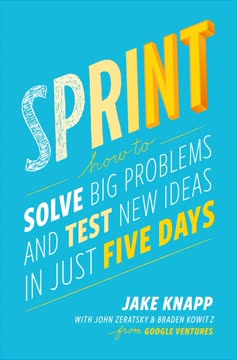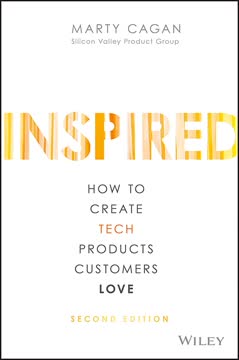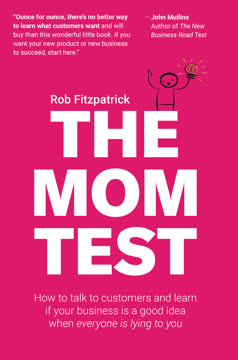Key Takeaways
1. Tech giants leverage free products to dominate markets
Google's strategy begins with getting as many people as possible to use Android.
Free doesn't mean unprofitable. Google's Android and Facebook's social media platforms are prime examples of how tech giants use free products to build massive user bases. This strategy allows them to:
- Collect vast amounts of user data
- Serve targeted advertisements
- Dominate market share and mindshare
By offering Android for free, Google ensures its services (Search, Maps, Gmail) are pre-installed on millions of devices. Similarly, Facebook's free social networks create a captive audience for advertisers. These companies have turned user attention into a valuable commodity, proving that in the digital age, if you're not paying for the product, you are the product.
2. Freemium and subscription models drive app monetization
Give away your app for free, so tons of people will download it, then make them pay for extra "premium" features.
Freemium unlocks value. Mobile apps and services have revolutionized monetization through freemium and subscription models:
- Basic features are free, encouraging widespread adoption
- Premium features or ad-free experiences are offered for a fee
- Subscriptions provide recurring revenue streams
Examples:
- Spotify: Free music streaming with ads, Premium for ad-free listening and offline playback
- Dropbox: Free storage with limited space, paid plans for more storage and features
- Tinder: Free swipes, paid plans for unlimited swipes and extra features
These models allow companies to capture both casual users and power users, maximizing their potential customer base and revenue.
3. Targeted advertising powers the internet economy
If you aren't paying for the product, you are the product.
Data fuels personalization. The internet economy is largely built on targeted advertising, which allows companies to offer free services while generating revenue. This model works by:
- Collecting user data through various interactions and behaviors
- Analyzing this data to create detailed user profiles
- Serving highly relevant ads based on these profiles
Google and Facebook dominate this space due to their vast data repositories and sophisticated algorithms. While this model has raised privacy concerns, it has also enabled the creation of numerous free, high-quality services that billions of people use daily.
- Pros: Free services, personalized experiences
- Cons: Privacy concerns, potential for manipulation
4. APIs enable rapid development and integration
APIs let apps talk to each other.
Interconnectivity drives innovation. Application Programming Interfaces (APIs) have become the building blocks of modern software development, allowing different applications and services to communicate and share functionality. This has led to:
- Faster development cycles
- Increased interoperability between services
- The rise of platform economies
Examples:
- Google Maps API: Powers location services in countless apps
- Stripe API: Enables easy payment processing integration
- Twitter API: Allows apps to interact with Twitter's platform
By leveraging APIs, developers can focus on their core product while tapping into powerful, pre-built functionalities, accelerating innovation and creating more robust, feature-rich applications.
5. Mobile operating systems shape the digital landscape
Android powers over 80% of the world's smartphones.
OS wars define tech ecosystems. The mobile operating system duopoly of Android and iOS has profound implications for the tech industry and consumers:
- App developers must choose which platforms to support
- Hardware manufacturers align with specific ecosystems
- User data and preferences are often siloed within each system
Android's open-source nature has led to widespread adoption, particularly in emerging markets. iOS, while having a smaller market share, dominates in high-value markets and often sees apps launched on its platform first. This competition drives innovation but also creates challenges for cross-platform compatibility and user choice.
6. Data-driven decision making revolutionizes business
A/B testing is a powerful, data-driven way to improve online products.
Metrics drive optimization. Companies are increasingly relying on data to make decisions, from product design to marketing strategies. Key aspects include:
- A/B testing to compare different versions of products or content
- Analytics to track user behavior and engagement
- Machine learning algorithms to personalize experiences
This approach allows businesses to:
- Iterate quickly based on real user feedback
- Optimize for specific metrics (e.g., click-through rates, conversion)
- Make more informed, objective decisions
However, over-reliance on data can sometimes lead to short-term thinking or neglect of qualitative factors that are harder to measure.
7. Emerging markets present unique tech opportunities
Jio was revolutionary, offering free voice calls forever and 1 GB of mobile data for just 50 rupees (then about $0.75).
Innovation thrives on constraints. Emerging markets like India are becoming hotbeds of tech innovation, driven by:
- Large, young populations hungry for technology
- Unique challenges that require novel solutions
- Leapfrogging older technologies
Companies like Jio in India have revolutionized mobile internet access by offering incredibly cheap data plans. This has led to a surge in mobile internet usage and the development of apps and services tailored to these markets. Tech giants are taking notice, with Google and Facebook investing heavily in these regions.
- Key factors: Affordability, localization, offline functionality
- Challenges: Infrastructure limitations, diverse languages and cultures
8. Tech policy and regulation struggle to keep pace with innovation
Algorithms aren't magic spells that run the world. They're just sets of rules (though complex ones) that other people wrote to make computers do a particular task.
Regulation lags behind technology. As technology rapidly evolves, policymakers and regulators face significant challenges in addressing its impacts:
- Privacy concerns in the age of big data
- Antitrust issues with tech giants' market dominance
- Ethical considerations around AI and automation
Key areas of focus:
- Data protection and user privacy (e.g., GDPR in Europe)
- Content moderation and platform responsibility
- Algorithmic transparency and accountability
The tech industry often moves faster than regulators can keep up, leading to a constant tension between innovation and oversight. Finding the right balance is crucial to ensure technological progress while protecting individual rights and promoting fair competition.
Last updated:
FAQ
What's Swipe to Unlock about?
- Technology and Business Primer: Swipe to Unlock by Parth Detroja is a guide that simplifies complex technology and business strategy concepts for readers of all backgrounds.
- Real-World Examples: It uses case studies from major tech companies to explain how technologies work and the strategies behind their success.
- Accessible Language: The authors present these concepts in plain English, making it easier for anyone to understand technology's impact on business and society.
Why should I read Swipe to Unlock?
- Essential Knowledge: Understanding technology is crucial in today’s job market, and this book equips readers with the knowledge to confidently engage in tech discussions.
- Diverse Audience: Whether you're a student, entrepreneur, or tech enthusiast, the book offers valuable insights into the tech landscape.
- Think Like a Technologist: It helps readers analyze tech topics critically and understand the underlying business motives.
What are the key takeaways of Swipe to Unlock?
- Core Concepts: Covers fundamental technology topics like software development, app economics, and cloud computing, providing a solid foundation.
- Business Strategies: Highlights how companies like Google and Facebook leverage technology for successful business models, emphasizing innovation.
- Future Trends: Discusses emerging technologies and trends, preparing readers to anticipate and adapt to changes in the tech industry.
How does Google search work, as explained in Swipe to Unlock?
- Crawling and Indexing: Google uses spiders to crawl the web, building an index of over 30 trillion pages, continuously updated for new content.
- PageRank Algorithm: Evaluates a webpage's importance based on the quality and quantity of links, rather than just keyword density.
- Relevance and Personalization: Retrieves relevant pages considering factors like recency and user location to deliver personalized results.
What is the freemium model discussed in Swipe to Unlock?
- Free Access with Paid Features: Users access basic app features for free, with premium features available at a cost, attracting a large user base.
- In-App Purchases and Subscriptions: Apps like Candy Crush and Spotify monetize through in-app purchases and subscriptions from dedicated users.
- Targeting Power Users: Focuses on converting a small percentage of users, known as "whales," who spend significantly on additional features.
How does Facebook make money without charging users?
- Targeted Advertising: Generates revenue through targeted ads, using user data to deliver relevant advertisements, maximizing engagement.
- Ad Auctions: Advertisers bid for ad placements in real-time auctions, considering bid amount and ad relevance.
- Data Utilization: Analyzes user behavior to offer highly targeted ad placements, making its advertising platform attractive and effective.
Why did BlackBerry fail, according to Swipe to Unlock?
- Underestimating Competitors: Dismissed the iPhone as a toy, failing to recognize its consumer appeal, allowing Apple to capture market share.
- Missed Trends: Did not adapt to the app economy, which shifted consumer expectations towards versatile smartphones.
- Complacency and Poor Execution: Focused on existing users, leading to stagnation, and rushed product launches resulted in negative feedback.
What is the significance of APIs in app development as explained in Swipe to Unlock?
- Facilitating Communication: APIs allow applications to communicate and share data, enabling integration without building everything from scratch.
- Types of APIs: Discusses feature APIs, data APIs, and hardware APIs, each serving different purposes like processing payments or accessing device features.
- Business Efficiency: Utilizing APIs saves time and resources, allowing developers to focus on unique features rather than reinventing technologies.
How does Spotify recommend songs to users?
- Discover Weekly Algorithm: Analyzes user listening habits to create personalized playlists like Discover Weekly.
- Collaborative Filtering: Compares user data to suggest songs that similar users enjoy, enhancing recommendation accuracy.
- Taste Profiles: Builds a taste profile for each user based on listening history, recommending songs from preferred genres.
What is A/B testing, and how is it used in the tech industry?
- Experimentation for Improvement: Involves comparing two versions of a feature to determine which performs better, optimizing user experience.
- Widespread Application: Used by companies like the Washington Post to refine content, maximizing click-through rates and interaction.
- Statistical Significance: Emphasizes analyzing results for statistical significance, ensuring changes are meaningful and not due to chance.
How does Airbnb make money according to Swipe to Unlock?
- Service Fees: Charges hosts a 3% service fee and guests a 6-12% service fee on bookings, a primary revenue source.
- Marketplace Model: Connects buyers with sellers, earning commission on transactions without charging for app access.
- Expansion Opportunities: Explores new revenue streams like offering experiences, maintaining a competitive edge in the travel industry.
What are the best quotes from Swipe to Unlock and what do they mean?
- "If you aren’t paying for the product, you are the product.": Highlights the trade-off in using free services like Facebook, where user data is monetized through ads.
- "APIs are a core part of pretty much every app out there.": Underscores the reliance on APIs in app development, facilitating functionality without extensive resources.
- "A/B testing is extremely effective.": Refers to comparing feature versions to improve products, emphasizing data-driven experimentation.
Review Summary
Swipe to Unlock receives mostly positive reviews, praised for its accessible explanations of tech concepts and business strategies. Readers appreciate its use of analogies and real-world examples. Many find it valuable for non-technical audiences and aspiring product managers. Some criticize it for being too basic for those already in tech or familiar with popular tech news. The book is commended for its broad coverage of topics but occasionally criticized for lacking depth. Overall, it's seen as a good primer for understanding the tech industry and its business aspects.
Similar Books










Download PDF
Download EPUB
.epub digital book format is ideal for reading ebooks on phones, tablets, and e-readers.




